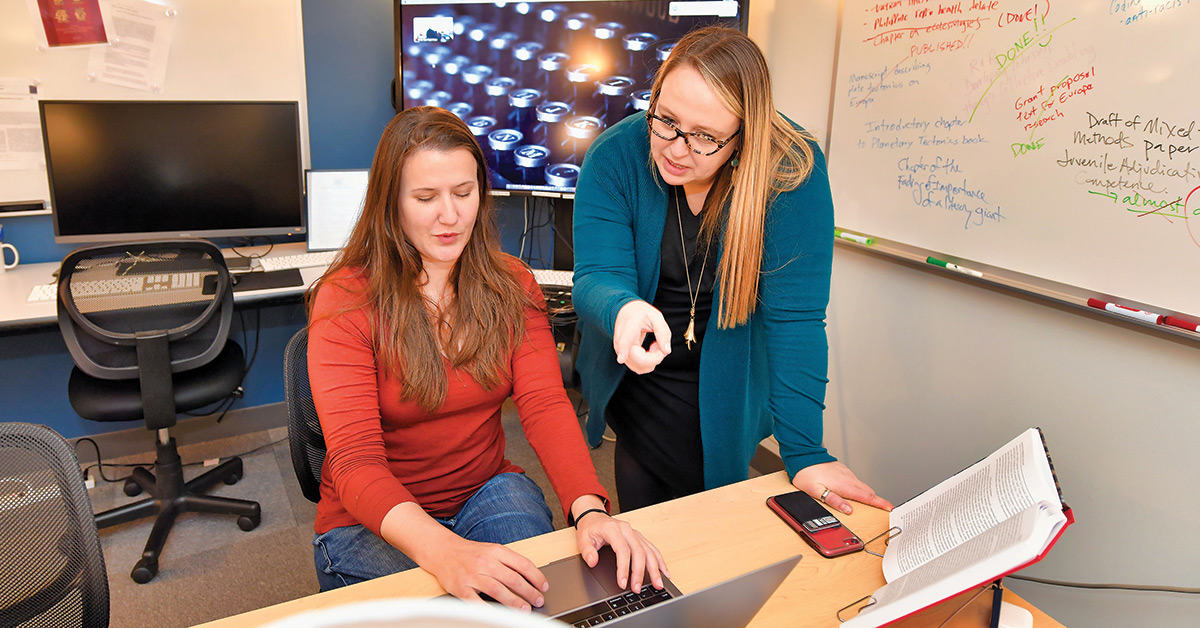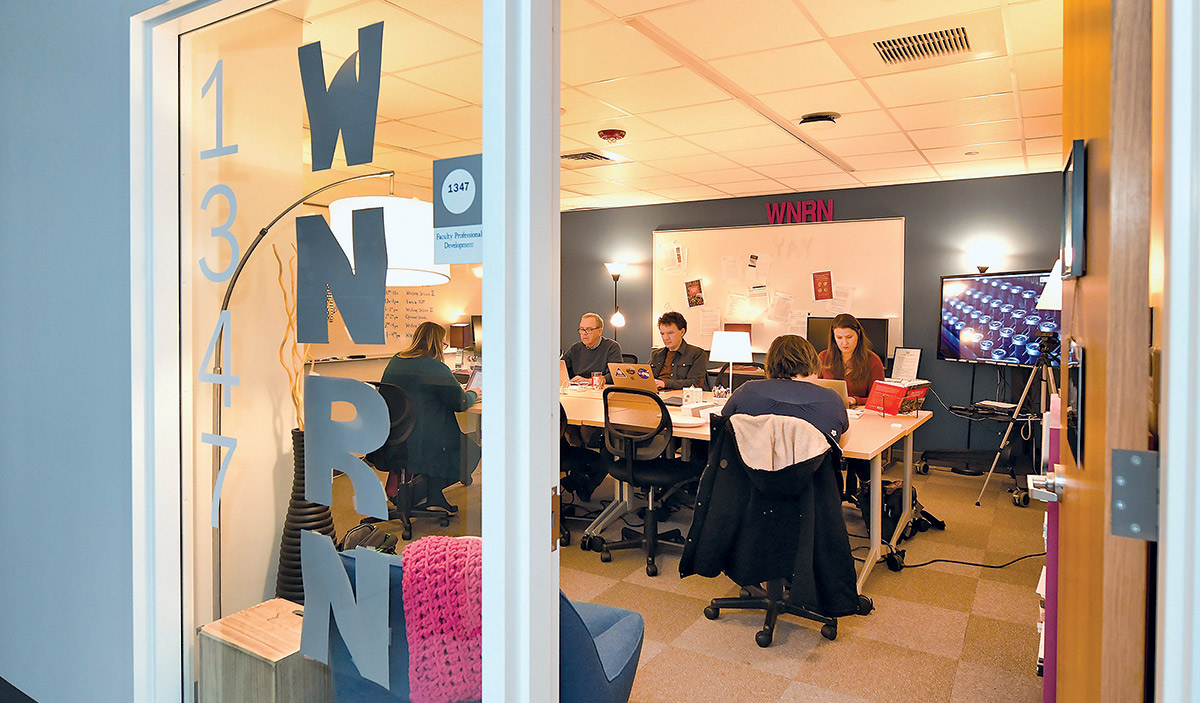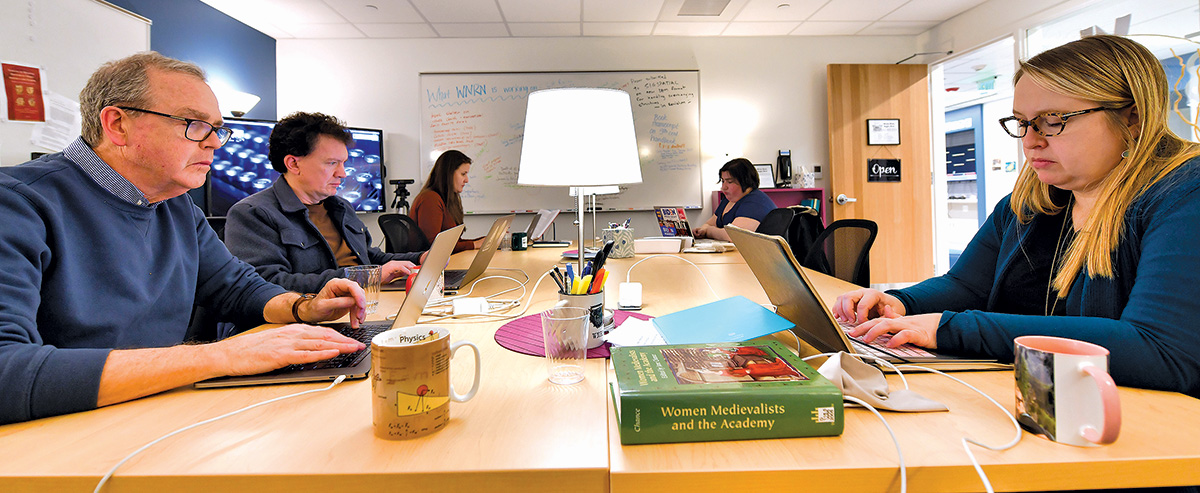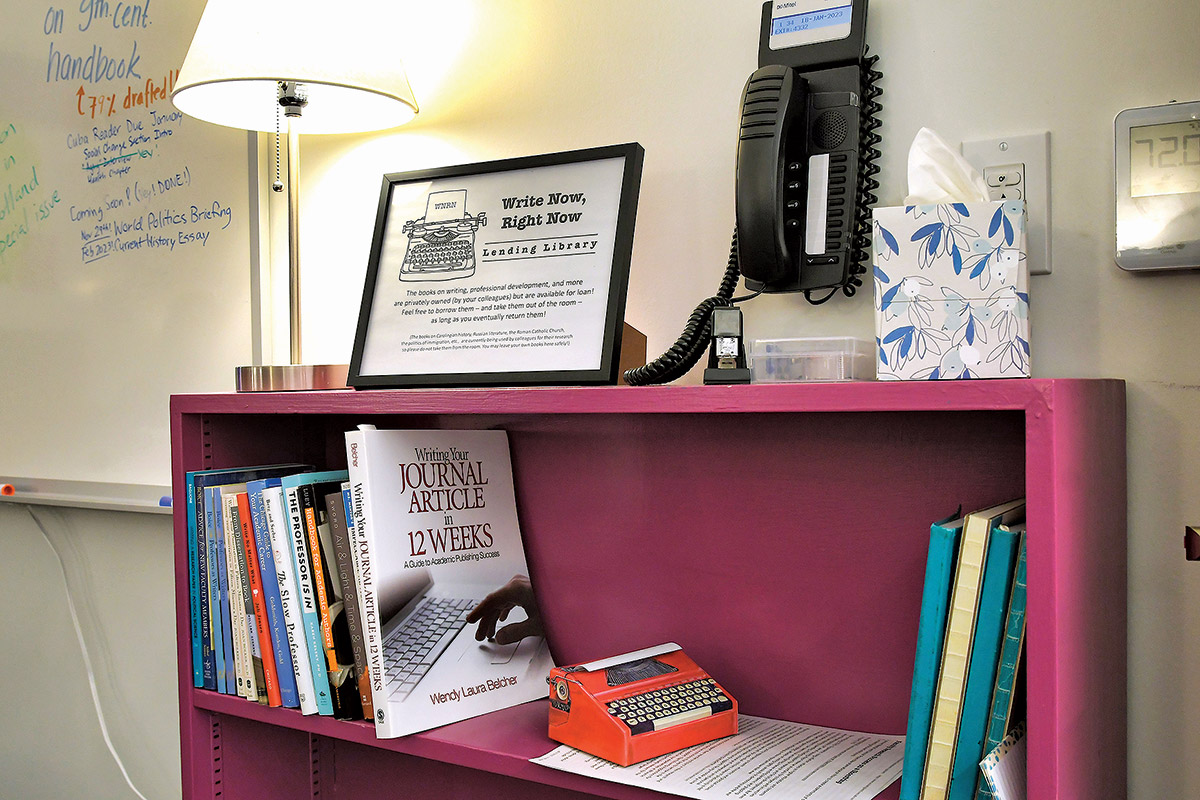Making room for creative pursuits

Writing space provides faculty time for scholarship, community building
By Dana M. Polanichka, Professor of History
Professors like myself at liberal arts colleges like Wheaton are passionate and accomplished teachers who love working with students. We are also scholars and artists who produce knowledge and create art, and this research and creative work is central to our careers, the education we provide and the excellence of our institutions.
During the academic year, teaching and myriad other time-sensitive obligations fill our days, nights, even weekends. As we write lectures, prepare classes and labs, grade assignments, hold office hours, serve on college committees and more, finding time and space to work on our scholarship proves incredibly difficult—a challenge that all higher education faculty face.
Here at Wheaton, we have created one solution. Write Now, Right Now (WNRN), a faculty-led initiative begun in fall 2016, supports us in our research and creative work. Moreover, through
WNRN, our faculty visibly model for students and the broader college community how one creates knowledge and art, day in and day out, amid all of life’s other obligations and expectations, meetings and to-do lists, while simultaneously strengthening the college and our community.

WNRN is most fundamentally a space: Room 1347 in the Diana Davis Spencer Discovery Center Dedicated to Free Speech and Innovation. There are tables and chairs, soft lighting, docking stations with large monitors, a professional development library, coffee, tea and snacks. Faculty host hours every weekday during the semester and most days during the summer, and invite colleagues to work alongside them—what we call co-writing. (Picture a coffee shop filled with people hard at work on their laptops.)
The space itself is key. “Every writer knows the importance of place,” said Tom Dolack, senior professor of the practice in Russian studies. “WNRN is a dedicated place where our brains can automatically shift to writing mode and block out the things that otherwise distract us.”
Dolack hosts many sessions in the writing room. He recently has been editing a volume called Cognitive Approaches to Russian Literature scheduled to be published by Lexington Press next year.
Katherine Mason, associate professor of sociology, wrote and revised her recently published book The Reproduction of Inequality: How Class Shapes the Pregnant Body and Infant Health (New York University Press, 2023) in WNRN. She already has plans to begin drafting her next book in co-writing sessions.
“WNRN has contributed incredibly to my sense of community, intellectual and otherwise, at Wheaton,” Mason said. “I’ve participated in different ways—attending in person during the semester, serving as a virtual meeting host when we were remote, and joining a group of WNRN participants for a writing retreat off campus. These activities have helped me stay connected to my writing, even when the demands of teaching made that challenging.”
The space also has contributed to greater joy and satisfaction in their work, participants noted.
“I have struggled for a long time at the boundary where the joy of performing research collides with the dread of writing it up for publication,” said Geoffrey Collins, professor of geology and an investigator on NASA’s Europa Clipper mission. “The gentle social pressure of WNRN has helped me to stop procrastinating and push forward on my writing tasks, so that more of the projects my students and I have done will see the light of day.”
Productive and inspired
WNRN aims to be not only supportive, but also inspiring.
Faculty list their current projects and stages of progress on a whiteboard. At any given time, one can see a growing list of a dozen-plus articles, grant applications, book manuscripts and conference papers in development on topics ranging from praying mantises to Muslim civic engagement, from juvenile adjudicative competence to medievalism in John Steinbeck’s writing.
Aubrey Westfall, associate professor of political science, said “the whiteboard helps me recognize my colleagues’ work, and demonstrates the breadth of knowledge generation happening on our campus. It makes me feel proud to be part of a vibrant scholarly community.”
Westfall, who works on the policies and sociopolitical practices regulating the political behavior of minoritized groups within Western democratic societies, wrote The Politics of Immigration in Scotland (Edinburgh University Press, 2022), as well as many articles, conference papers and a co-authored book in WNRN.
WNRN’s effect on productivity and output among participating colleagues has been tremendous. My own (Dana M. Polanichka) productivity has at least tripled. Since founding WNRN, I have published six essays on gender, space and Christian devotion in the early medieval empire of Charlemagne; co-edited a volume on medieval cultural identity and power; and drafted two book manuscripts on early medieval women, to name a few.
Also, Westfall and I have used the room to collaboratively co-author three articles about this space and its programming that have been published in The Chronicle of Higher Education and Inside Higher Ed.
Linda Eisenmann, professor of education, used the space to write a literature review on the history of women and gender in higher education. It was published in 2023 in the Higher Education Handbook of Theory and Research.
Miranda Yaver, assistant professor of political science, has been working on her book manuscript Coverage Denied: The Scope and Impact of Denied Medical Coverage in the United States (under contract at Harvard University Press) in WNRN since joining Wheaton in fall 2022.
John Partridge, professor of philosophy, most recently has been using the room to work on an article on the role that happiness plays in a meaningful life.
“The chance to do regular writing in a supportive group made a huge difference to my ability to sustain productivity during the busier parts of the semester,” said Partridge, noting that it also has kept his research life in the foreground.
Jonathan Brumberg-Kraus, professor of religion, expressed similar sentiments: “Pretty much everything I’ve written, published, presented or proposed since its inception [a book, numerous articles, conference presentations, a Fulbright and other grant applications, and at least three new book proposals] has benefited from the time and space I spent in our WNRN writing room and with my writing group.”
His book Gastronomic Judaism as Culinary Midrash (Lexington, 2020) is a notable example on that long list.
Jonathan Chow, assistant professor of political science, said WNRN made “an enormous difference in my research during my sabbatical. Having a space where I could go to write every day and check in with wonderfully supportive colleagues made it so much easier to maintain a writing routine and make progress on my book manuscript.”
Chow has devoted the majority of his time in WNRN working on a book (under contract with Routledge) that explores the Roman Catholic Church’s engagement with transnational moral norms regarding human trafficking and access to contraception.

Chapter one
WNRN is a grass-roots effort that drew its initial inspiration from the international co-writing community called “Shut Up & Write!” I (Dana) first heard about co-writing in spring 2016 when I was struggling with my own research productivity, seeking better writing habits and yearning for a more communal intellectual life.
I decided to reach out to Wheaton colleagues and friends for their advice. Their responses demonstrated a widespread need among faculty for research support and resulted in many great ideas, including co-writing, upon which I seized.
In fall 2016, I found open hours in my schedule, booked rooms, shared colorful flyers to invite colleagues and rolled in a makeshift coffee cart multiple days per week. A few faculty members became co-writing stalwarts, and by January 2017, the college offered its support in the form of space and funding. Meanwhile, I formed a dynamic collaboration with Westfall that has sustained and strengthened WNRN, particularly during our varied sabbaticals and semesters abroad.
While many research universities host faculty professional development centers, very few small liberal arts colleges do, and no schools that we know of host regular co-writing sessions. WNRN fills that gap and helps us collaborate with colleagues at research universities.
“Most of my science collaborators work at research institutions and don’t always appreciate the many roles we have to play as faculty at a liberal arts college,” said Collins. “It is all too easy during the semester to put off my research in the face of all the other tight deadlines and competing demands for my time. … With WNRN, I found that I could more effectively keep up with my research collaborators even during a busy teaching semester.”
The ability to collaborate makes WNRN a vibrant, inclusive community where faculty connect, share advice and ideas, and mentor one another. It draws professors out of labs and offices during breaks and serves as an open invitation to interact with each other across departments and disciplines, and as a welcoming space for new faculty.
“The community of graduate school is often lost when you become a new faculty member,” said Sabrina Speights, assistant professor of business and management, who began using the room soon after joining Wheaton in 2018 to pursue her research on work-life interface and managing emotions in work-family conflict. “WNRN has been great because it offers a community that encourages research that I can simply drop into that is already established.”
Fatima Jebari, assistant professor of business and management, who began working at Wheaton in 2020, added: “As a junior faculty member new to Wheaton, WNRN has been a space where I could meet other colleagues and write.”
Jebari studies the impact of political activism and social responsibility on the decisions made by corporations.
C.C. Chapman, senior professor of the practice of business and management, said that “WNRN was one of the first places on campus where I immediately felt welcomed as a colleague rather than being judged first by my academic accomplishments. The welcoming environment enables anyone to do more.”
In WNRN, he wrote the proposal that helped lead to Wheaton’s new marketing major and minor.

An “incubator” for ideas
One of the most artful descriptions of WNRN and its effect on faculty scholarship has come from Matthew Gingo, associate professor of psychology: “I love celebrating everyone’s publications, but I know that if you want a tree to grow, you water the roots, not the leaves. If there is an intellectual incubator on campus, a greenhouse where our scholarly endeavors take root and are nurtured, WNRN is it.”
It is a description that also speaks to the nourishing environment that has led to the start of many other programs from the roots planted in WNRN. Those include writing retreats; the formation of faculty writing groups; Faculty Flash Talks that allow the sharing of the research with colleagues in an informal setting; and an annual Faculty Success Summit that offers workshops on grants and fellowships, publishing, student-faculty research collaboration, technology and more.
The lessons learned from WNRN also positively have affected senior seminars in history and political science, with students working on their own original research papers in a designated student co-writing space in Knapton Hall. Laura Bohn Case, senior professor of the practice of German, has introduced the idea of co-writing to her translation course. And I also have introduced the concept to my new writing course.
For faculty, staff and students, WNRN has turned the solitary act of writing into an act of solidarity and community.
